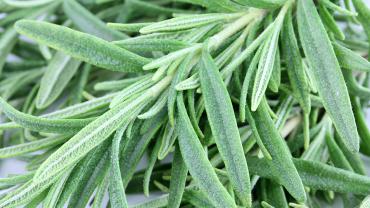
Rosemary lends its distinct flavor and aroma to many dishes, and it also has a long tradition of medicinal use. The phytochemicals in rosemary impart potential beneficial actions, including anti-inflammatory, antimicrobial, antioxidant, and immunomodulatory effects. Researchers have investigated some of these phytochemicals, in addition to rosemary, to determine their potential to help reduce inflammation and support inflammatory conditions.
The Phytochemicals in Rosemary
The potential anti-inflammatory phytochemicals discerned by researchers include rosmarinic acid, carnosic acid, carnosol, eucalyptol, eugenol, ursolic acid, and luteolin. Rat studies demonstrated the ability of carnosic acid and rosmarinic acid to suppress several pro-inflammatory cytokines, including tumor necrosis factor (TNF)-α and interleukin (IL)-6, and their ability to inhibit the activation of nuclear factor (NF)-κB. One study found rosmarinic acid and carnosic acid restored NF-κB levels to that of the control group, which did not undergo the inflammatory conditions. In these studies, the reduction in inflammatory markers also led to benefits for inflammatory conditions, including diabetes and rheumatoid arthritis.
Oral ingestion is not the only way to potentially benefit from these anti-inflammatory phytochemicals. One mouse study found that topical application of carnosol significantly inhibited inflammatory responses after UVB exposure. There was a decrease in the activation of signal transducer and activator of transcription 3 (STAT3), which is a transcriptional factor that regulates inflammatory genes, and a decrease in the expression of inducible nitric oxide synthase (iNOS) and cyclooxygenase-2 (COX-2). Additionally, the levels of TNF-α and IL-1β in the carnosol-treated group were significantly lower than the ultraviolet B (UVB)-exposed group without carnosol and similar to the control group who were not exposed to UVB or given carnosol.
The Potential Benefits of Rosemary Extract
Phytochemicals likely play a significant role in providing the benefits of rosemary, and it is likely that they also work synergistically. Mouse models have demonstrated anti-inflammatory effects of rosemary extract, including inhibiting leukocytes and many pro-inflammatory mediators as well as provide benefits for neuropathic pain.
One mouse study found rosemary extract provided neuroprotective and anti-inflammatory effects on an aluminum-induced neurotoxicity model. This study compared the effects of rosemary extract and the pharmaceutical methylphenidate (MPH), a central nervous system stimulant. The rosemary-treated group had similar beneficial results in memory and neurodegeneration as the MPH group. The rosemary group experienced a better improvement in the restoration of spatial memory than the MPH group and experienced a significant decrease in IL-6 expression, whereas the MPH group did not.
Dietary consumption may also provide some of these benefits. According to one crossover, randomized controlled trial, adding rosemary as part of a spice blend reduces the postprandial inflammatory cytokine response to a high saturated fat, high carbohydrate meal. In this study, participants consumed a high fat, high carbohydrate meal with either 2 grams or 6 grams of a spice blend containing rosemary, basil, bay leaf, black pepper, cinnamon, coriander, cumin, ginger, oregano, parsley, red pepper, thyme, and turmeric. Consuming 6 grams of spice blend, which had 0.31 grams of rosemary, led to a significant reduction (1,314%) in the secretion of inflammatory cytokine IL-1β at 240 minutes after the meal compared to no spices. IL-8 and TNF-α also experienced significant reductions. It is likely that these spices worked synergistically for some of these benefits.
Consuming rosemary and other spices in the diet may play a beneficial role in promoting a health inflammatory response. Those looking for additional support for a healthy inflammatory response may wish to have a discussion with their doctor regarding the potential for supplementing with rosemary extract.
By Kendra Whitmire, MS, CNS